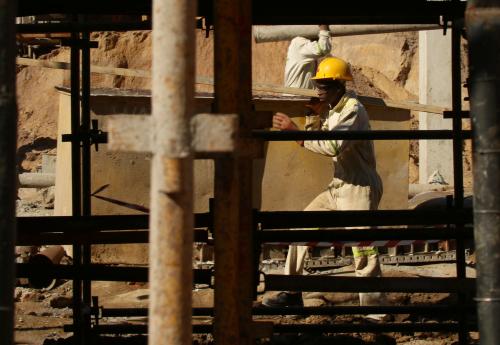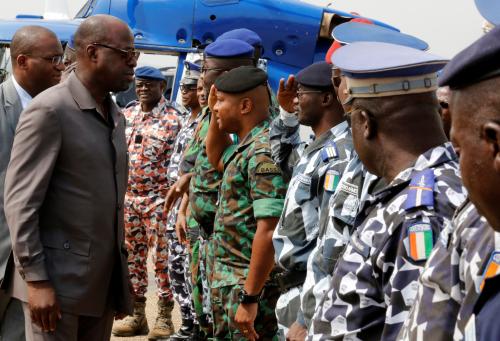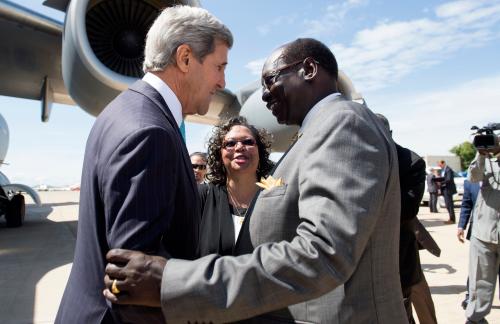African leaders attend China’s Belt and Road Summit
On May 14-15, 2017, China held a flagship summit in Beijing on its “One Belt, One Road” program, an initiative that aims to expand China’s influence across Asia, Europe, and Africa through infrastructure development in and increased trade with more than 60 countries. Based on the historical Silk Road route used by Chinese explorers and traders to spread their cultural influence, the Belt and Road program launched in 2013 strives to enhance trade connectedness. As Chinese President Xi Jinping stated in the forum’s opening ceremony, “We intend to create one big family based on harmonious co-existence.” He also pledged a further $14.5 billion to fund trade-related infrastructure projects around the world.
Two African leaders—Ethiopia’s Prime Minister Hailemariam Desalegn and Kenya’s President Uhuru Kenyatta—were among the 29 world leaders invited to participate in the forum. On day one of the forum, Desalegn remarked, “We continue to view China as a successful economic model and reliable ally in the fight against poverty and in the quest for prosperity.” Notably, China completed an electrified rail project earlier this year that connects the Ethiopia capital Addis Ababa to Djibouti. On the sidelines of the forum, Kenyatta held talks with Chinese Premier Li Keqiang regarding infrastructure projects in Kenya and rebalancing trade with Africa more generally, which has become a deficit in recent years. While many, including Kenyatta, argue that improving infrastructure will help integrate Africa into regional and global trade networks and spur economic growth, critics warn that some countries are taking on too much Chinese debt in the process, which could ultimately jeopardize their economic and political sovereignty.
Violence escalates in rural Central African Republic (CAR)
On Wednesday, the Red Cross stated that its workers discovered 115 bodies in the Central African Republic town of Bangassou where, last Saturday, anti-Balaka armed men attacked the base of the U.N. mission in the CAR (MINUSCA). The armed men then attacked the Muslim neighborhood of Tokoyo. On Monday, violence erupted in the town of Bria, where Médecins Sans Frontières treated 24 wounded, and nearly 1,000 civilians were forced to seek refuge near the U.N. base. Last week, a three-day clash in the town of Alindao between anti-Balaka fighters and an ex-Séléka group killed 100 and displaced 8,500 people. The recent string of attacks have killed six U.N. peacekeepers, the deadliest attack on MINUSCA since its inception in 2014.
United Nations spokespeople expressed “great alarm” over the spread of the fighting. Moreover, the organization has stated that the absence of violent fighting in the capital Bangui and other large cities in the CAR could be undermined by the recent increase in violence in rural areas. The U.N. plans to deploy more peacekeeping troops in response to the recent spike in violence.
The Central African Republic has been marred by ethno-political conflict since 2013 when a coalition of mainly Muslim rebels (named Séléka) overthrew the government in March 2013. The group has since been dismantled but there remains a fraction of it, the ex Sélékas. They are now opposed by the majority Christian anti-Balaka militia.
Côte d’Ivoire mutiny ends
On Tuesday, May 16, soldiers in Côte d’Ivoire struck a deal with the government to end their four-day mutiny over bonus payments promised to end a similar mutiny in January. The government has already paid out 8,400 soldiers with 5 million CFA francs each ($8,400), but the collapse in the price of cocoa, the country’s main export, has put pressure on the government’s finances. The new deal promises an “immediate” bonus payment of 5 million CFA francs to 8,400 mutineers as well as another 2 million CFA francs to be paid at the end of June.
Already, soldiers are returning to their barracks and have withdrawn from Bouake, the country’s second-largest city, which they had cut off from the rest of the country on Saturday. During the mutiny, renegade soldiers had also taken control of the national military headquarters and defense ministry in Abidjan. Sporadic gunfire was reported across the country, and NPR reports two deaths and nine wounded citizens.
In line with a recent trend of regional activism, West African leaders called for peace and an end to the mutiny in Côte d’Ivoire. On Monday, on behalf of ECOWAS (Economic Community of West African States), President Ellen Johnson Sirleaf of Liberia issued a statement instructing the mutineers to end their campaign, stop the violence, and allow citizens to resume their normal activities. Nigerian Acting President Yemi Osinbajo similarly called for an end of the mutiny, discussing the issue with both Sirleaf and Ivorian President Alassane Outtara.







Commentary
Africa in the News: African leaders attend China One Belt, One Road summit, violence escalates in Central African Republic, and Cote d’Ivoire mutiny ends
May 19, 2017